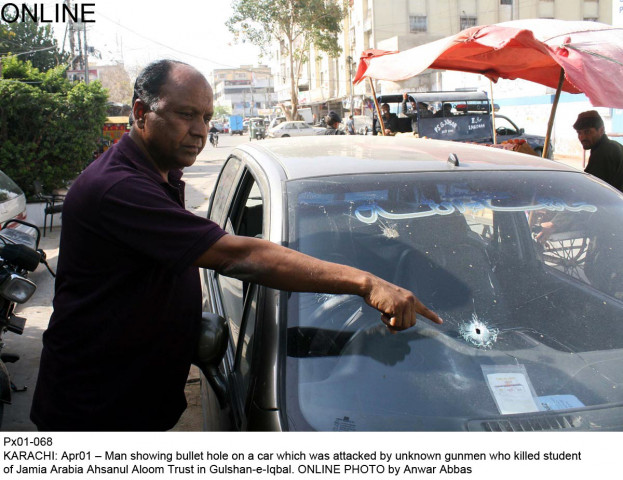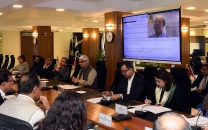Sectarian violence: Over 2,000 people killed in 5 years, Interior Ministry tells Senate
Senate told that some seminaries were getting funding from abroad, including through banking channels.

Killings per district: Fata (867), Balochistan (737), Sindh (252), Punjab (104), G-B (103) and K-P (22). PHOTO: ONLINE/FILE
The figures were revealed in a written reply from the ministry of interior during the question hour.
Balochistan, which has seen deadly attacks on the resident Shia Hazara community, witnessed 737 killings.
Sindh, where a number of doctors, professors religious leaders belonging to the their sect have been targeted in recent years, 252 were killed over sectarian differences between January 2008-January 2009.
Punjab, which saw some of the worst riots in the country last year following a clash of two groups in Rawalpindi on Ashura that resulted in a curfew, 104 people were killed in sectarian violence over five years.
Khyber-Pakhtunkhwa 22. Gilgit-Baltistan, which has belied its largely peaceful outlook with incidents of sectarian violence, saw 103 people falling victim to sectarian violence. Five people lost their lives in Islamabad in sectarian attacks.
The exact number will probably be a bit higher since the reply provided covered the period from January 2008 to January 2014.
Senators from different political parties contested the figures provided by the ministry and also asked the state minister about number of convictions of those who were arrested on charges of sectarian violence.
However, the minister did not answer that question, further irking the members.
Madrassas getting funding from aboard
The government also confirmed during Wednesday’s session that some seminaries were getting financial support from abroad.
“Some seminaries/madrassahs in the country are receiving financial support from foreign Islamic countries. The remittances are received through banking channels,” the interior ministry confirmed in its written reply to a question by Pakistan Peoples Partys Sugra Imam.
The state minister for interior Balighur Rehman said that the State Bank of Pakistan had started compiling data of all such remittances. The ministry’s reply, however, did not contain any estimates on funding coming through other channels.
Legislation on cards to take away role of GHQ in issuing POF weapons
Awami National Party’s Zahid Khan was concerned that POF Wah Cantt was not issuing weapons to some parliamentarians despite having obtained the prerequisite approvals from the ministry of interior. He accused that ministry authorities were hurdle in issuing these weapons.
Minister for defence production Rana Tanveer informed the house that 256 cases were pending before his ministry where applicants, including 17 of parliamentarians, had attained no objection certificates to purchase weapons from Wah Cantt.
Tanveer said that his ministry was working to amend the law which would do away with the role of GHQ in issuing weapons to such cases. He further said that a total of 239 Parliamentarians were issued weapons by POF Wah Cantt from 2009 to 2014.
Senate disapproves a bill and an ordinance
Having numerical majority in the Upper House, the Opposition parties managed to disapprove a bill and a presidential decree with majority vote.
MQM’s Nasreen Jalil presented report on Sales Tax Amendment Bill 2014 that sought to annul a Supreme Court’s directives on correction of tax mechanism for CNG sector. She also moved a resolution to disapprove the Bill, which was adopted by majority through voice count.
After the disapproval in Senate, future of the proposed law is bleak, unless the government amends it before approving it from the National Assembly.
The Senate also rejected by majority vote the PMDC Amendment Ordinance that sought to vest the federal government with powers to control of the regulatory body.
The Ordinance was laid before the Senate last week and as per Constitution any member can move a resolution calling for its disapproval.
The disapproval motion was jointly moved by PPP Senators Farhatullah Babar and Raza Rabbani.
Senator Babar said that the PMDC was an autonomous regulatory body which under a federal legislation was responsible for establishing uniform minimum standard of medical education, regulate the conduct of medical and dental practitioners across Pakistan and monitor and maintain standards of medical education.
He reminded the House that all regulatory bodies, the medical education; and related institutions fell under items listed in Part-II of the Federal Legislative List, the policy formulation for which was the responsibility of Council of Common Interest.
Babar said that under Article 154 of the Constitution, policy formulation in matters listed in part-11 of the Federal Legislative List is the responsibility of the Council of Common Interest and not of the federal government and PMDC being a regulatory body was the responsibility of CCI, adding that the federal government cannot take over the functions of the regulatory body.
The resolution was the put to vote which the House disapproved the ordinance before it could be transformed into a permanent law.
Minister for Planning and Development Ahsan Iqbal laid before the House another report of Pakistan Vision 2025 and Millennium Development Goals.



















COMMENTS
Comments are moderated and generally will be posted if they are on-topic and not abusive.
For more information, please see our Comments FAQ